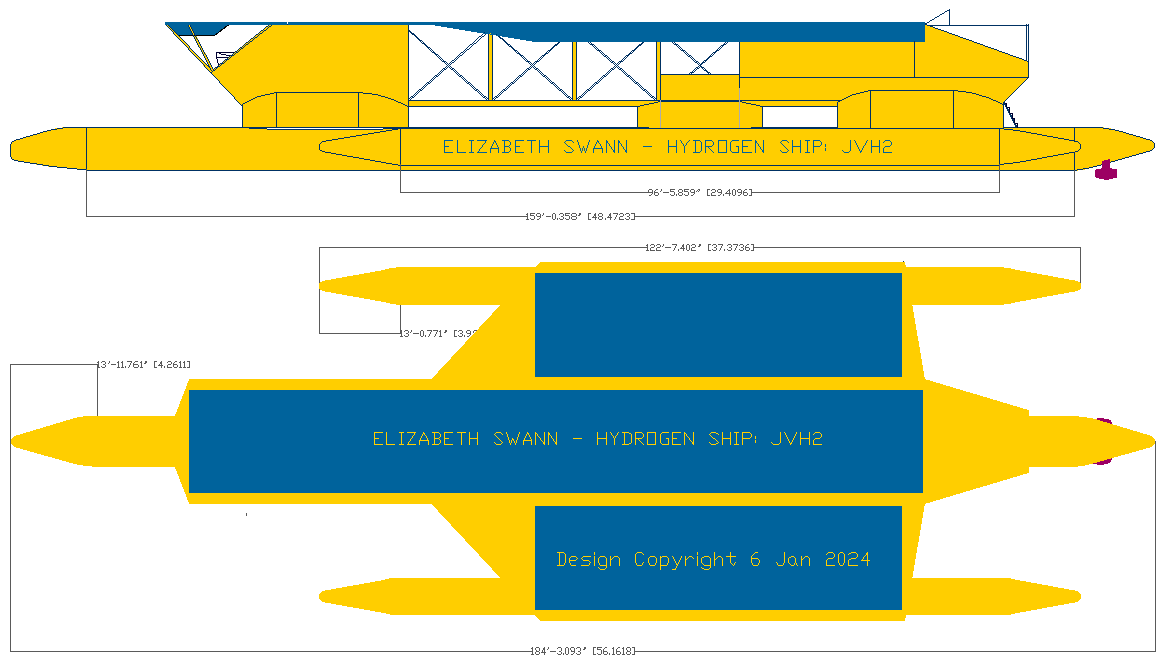|
WEIGHT ANALYSIS - DISPLACEMENT (V2 [2023])
Please use our A-Z INDEX to navigate this site or return HOME
|
|||||||||||||||||||||||||||||||||||||||||||||||||||||||||||||||||||||||||||||||||||||||||||||||||||||||||||||||||||||||||||||||||||||||||||||||||||
DESIGN WEIGHT - It's very different working in paper and cardboard, compared to marine alloys. We should also consider that our model tests will mostly be conducted in fresh water which is 1 kg/liter as opposed to 1.025 kg/liter for seawater - meaning that the full size vessel will have that advantage also, unless that is the operators intend navigating mainly in rivers.
In the last couple of years, and as fresh information has become available, the design has been revised, to include the up-grading of the forward helm, to an inverted chisel arrangement, which allows greater solar panel area and forward vision. The length of the 1:20 proof of concept model has thus increased. In addition, it was decided, that for these tests we'd use commercially available solar modules, and a lithium charge regulator.
The vessel is being developed as a Jules Verne Trophy (JVH2) contender, aiming to become the world's fastest hydrogen powered vessel.
1:20
MODEL SHIP TARGET WEIGHTS V2 CHISEL
HELM (items
individually weighed)
To cope with the increase in displacement, we upped the diameter of the main hull and outriggers to 110mm and 75mm diameter, respectively. The displacement has crept up considerably over the previous estimates (35.44 lbs & 16.08kg), almost double. Granted, the model has increased in size and complexity.
Displacement per Meter/Length 110mm hull = 9.5kg Displacement per Meter/Length 75mm hull = 4.42kg
And, don't forget, we need a substantial reserve buoyancy. Not including the foils that join the hulls to the superstructure. There are four foils. One for each outrigger, and two joining the main or central hull, to the superstructure. At this stage we are calling the bow and stern profiles, cones. Because they literally are (rocket cone shaped), until water tank testing to refine the design.
R1
Revised Main hull length (draft) 2.6m = 24.70 Revised Outrigger lengths x 2 (draft) 1.5m = 13.26 TOTAL = 37.96 kg displacement (8.92kg reserve 23.6%)
R2
Revised Main hull length (draft) 2.7m = 25.65 Revised Outrigger lengths x 2 (draft) 1.6m = 14.14 TOTAL = 39.79 kg displacement (10.77kg reserve 27.1%)
R3
Revised Main hull length (draft) 2.8m = 26.60 Revised Outrigger lengths x 2 (draft) 1.7m = 15.03 TOTAL = 41.63 kg displacement (12.61kg reserve 30.3%)
R4
Revised Main hull length (draft) 2.8m = 26.60 Revised Outrigger lengths x 2 (draft) 1.8m = 15.91 TOTAL = 42.51 kg displacement (13.49kg reserve 31.7%)
NOTE: These estimates do not include the displacement of cone ends. Which can add to the Overall Hull Length, or be included in the OAL, in which case the displacement reduces. Typically: 0.2m x 2 / 2 = 0.2m (approx) for the main hull.
DISPLACEMENT - This is a CAD drawing for a revised main hull @ 2800mm with 1870mm outriggers (D4 43.72kg) proof of concept model at 1:20 scale. Design copyright 6th January 2024. Cleaner Ocean Foundation, all rights reserved. The model is to include solar assistance and hydrogen power, with intermediate battery store. Potentially, the world's fastest solar or hydrogen ship.
D1 Calcs for 90mm dia. outriggers
Revised Main hull length (draft) 2.5m = 23.75 (2.9m OAL incl. cones, adding 1.9kg displacement) Revised Outrigger lengths x 2 (draft) 1.0m = 12.64 TOTAL = 36.43kg displacement (7.41kg reserve 20.3%)
D2 [NOT BAD]
Revised Main hull length (draft) 2.5m = 23.75 (compromise 2.7m incl. cones minus 0.95kg displacement) Revised Outrigger lengths x 2 (draft) 1.2m = 15.22 TOTAL = 38.97kg displacement (9.95kg reserve 25.5%) (TOTAL = 38.02kg displacement (9.0kg reserve 23.67%)
D3
Revised Main hull length (draft) 2.6m = 24.70 Revised Outrigger lengths x 2 (draft) 1.5m = 19.02 TOTAL = 43.72 kg displacement (14.7kg reserve 33.6%)
D4 [BETTER]
Revised Main hull length (draft) 2.7m = 25.65 Revised Outrigger lengths x 2 (draft) 1.6m = 20.29 TOTAL = 45.94 kg displacement (16.92 kg reserve 36.8%)
D5
Revised Main hull length (draft) 2.8m = 26.60 Revised Outrigger lengths x 2 (draft) 1.7m = 21.56 TOTAL = 48.15 kg displacement (19.13 kg reserve 39.7%)
Weight estimates for a model may not be so critical, but when it comes to cutting metal full size, mistakes can be costly. Hence, working in scale for all design conceptualizing. The value in constructing a small scale model is not limited to just tank testing. Potential design issues are frequently encountered, giving the project managers useful advance information of obstacles that may need to be overcome.
The speed/length ratio is good for the main hull. Supposing (and not included at this stage) that the bow and stern (entry & exit) profiles are optimised.
FULL SIZE SHIP TARGET WEIGHTS (CHISEL HELM)
HULL DRAG - The weight of the hull determines our hull drag - dependent on many variables, such as conversion efficiency. You can see from energy estimates graph, that to reach our 10 knot goal, we need around 27kW of continuous energy across the Atlantic, for which we'd need ideal conditions. A more easily achieved target would be 7.5 knots, requiring 14.5kW continuous. While the present record of 5.3 knots, held by PlanetSolar, could be equaled with just 7.5kW of energy from the sun, if our mass is 36,300kg, for our wave piercing trimaran design.
2. A single central wave piercing hull stabilized by outriggers as a trimaran including:
a) Ultra light superstructure purposed designed to harvest energy from nature via b) and c) below,
b) Solar wings that track the sun and fold for storms, in concert with
c) A turbine generator on a mast that tracks wind conditions and furls for storms.
The theoretical displacement we are working towards is: 30,000 - 45,000 kilograms (target) in 5083
marine grade alloy.
|
|||||||||||||||||||||||||||||||||||||||||||||||||||||||||||||||||||||||||||||||||||||||||||||||||||||||||||||||||||||||||||||||||||||||||||||||||||
|
Please use our A-Z INDEX to navigate this site or return HOME
This website is Copyright © 2024 Jameson Hunter Ltd
|

